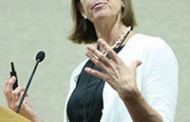ARCHIVES FOR 2014
Just as advances in medicine are changing the treatment of patients with diabetes, advances in academia are changing the development of diabetes educators and their paths to leadership in me… Read more
Social media often has negative connotations of insensitive tweets and postings about what someone had for dinner. In the community of persons with diabetes, though, “social media” has becom… Read more
The Affordable Care Act (ACA) has support from AADE and several other professional organizations, but work remains to make it work better for diabetes educators, physicians, nurses, dietitia… Read more
Metformin is widely used as the antidiabetic drug of choice for people with type 2 diabetes, but it also may have benefits in protecting against cardiovascular disease, cancer, stroke, and d… Read more
Diabetes self-management education (DSME) can play a key role in strengthening the patient-centered medical home healthcare delivery model that emphasizes care coordination and communication… Read more
Persons in different generations with diabetes appear to learn in different ways, and diabetes educators need to understand how to adapt the AADE7 Self-Care Behaviors™ to various generations… Read more
With the growing use of mobile phones and tablets, diabetes educators have an opportunity to increase patient access to diabetes education and expand their practices by engaging in telehealt… Read more
All too often, diabetes educators encounter patients who for any number of reasons have difficulty with diabetes self-management. And educators tirelessly work to facilitate lifestyle modifi… Read more
Four breakout session speakers will highlight how their food banks have partnered with healthcare organizations in their communities to identify low-income people with diabetes, and provide… Read more
Young adults ages 18 to 26 with type 1 diabetes have an average A1C that is significantly higher than what American Diabetes Association guidelines call for, and the A1C percentage is trendi… Read more
The Diabetes Attitudes Wishes and Needs (DAWN) study was groundbreaking at the time of its publication in 2001 because of its size, scope and international focus. The findings revolutionized… Read more
The reality of health care is that compared to past eras, today’s patients want to be more informed and involved in making choices about their treatments. To meet the demands of this changin… Read more









